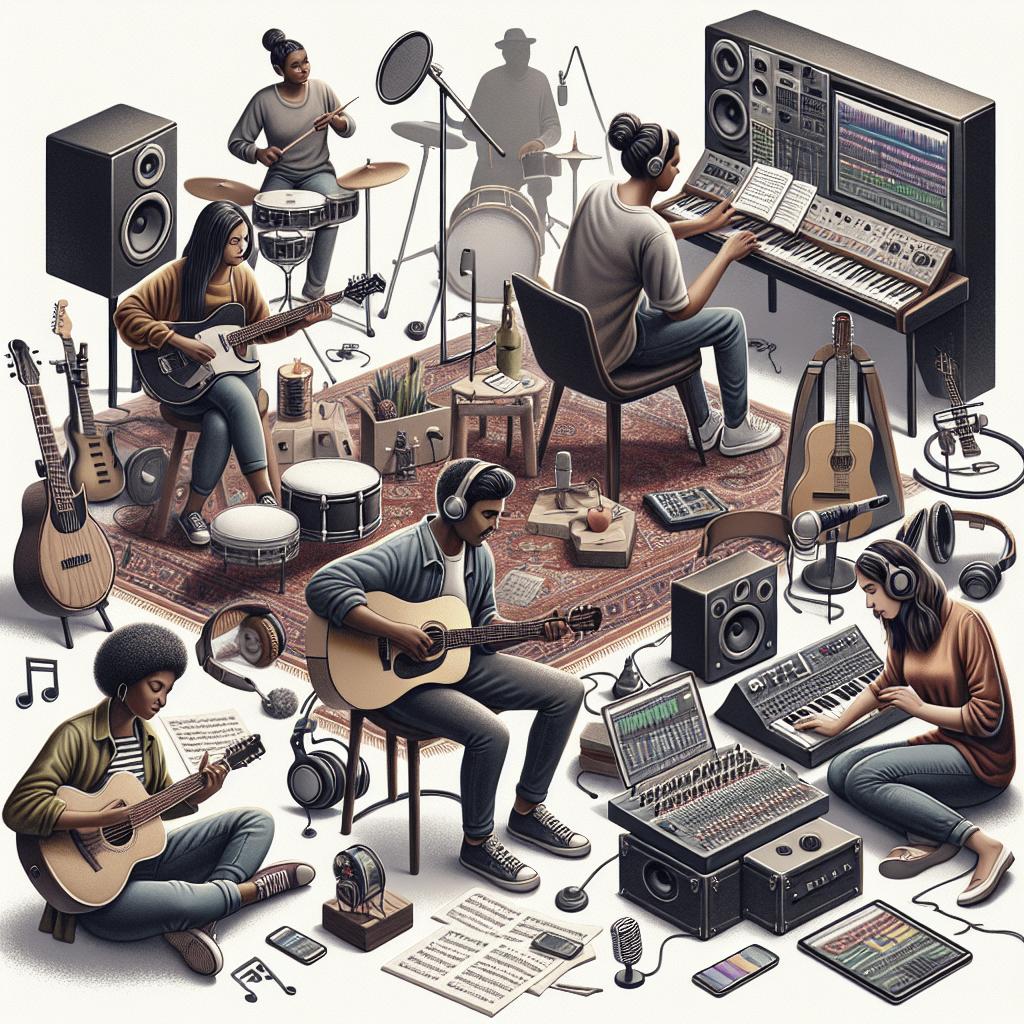“`html
How to Start a Career as an Independent Musician
The path to becoming an independent musician is as rewarding as it is challenging. This guide will walk you through the essential steps, from understanding the music industry dynamics to mastering financial management. We’ll cover building your brand, producing quality music, distributing and licensing your work, and more. Learn how to engage with your audience effectively, expand your reach through live performances and strategic collaborations, and market your music like a pro. Fuel your music career with smart planning and insights into music royalties and the role of performing rights organizations. Ready to make your mark? Let’s dive in!
1. Understanding the Music Industry
Breaking into the music industry as an independent artist requires more than just talent; it requires a deep understanding of the industry’s landscape. Familiarize yourself with different roles such as producers, sound engineers, promoters, and managers. Understanding these roles helps you interact efficiently within the music ecosystem.
Additionally, identifying trends is crucial. Genres, social media platforms, and technology continuously evolve. Keeping abreast of these changes can help tailor your approach in producing music that resonates with current audiences. This continuous learning mindset is crucial for adaptability within an ever-changing industry.
2. Building Your Brand
Creating a recognizable brand identity is vital for any independent musician. It involves developing a unique image and sound that distinguishes you from others. Start by defining your musical style, target audience, and visual persona, and ensure consistency across all platforms.
Your brand will be the foundation upon which you build your promotional activities. Consistent branding helps your audience recall the music you produce and can significantly increase your follower base. Always showcase authenticity and let your personality shine through your brand.
3. Producing High-Quality Music
High-quality production is a non-negotiable standard in today’s competitive music industry. Investing in good quality recording equipment or hiring a professional studio can make a significant difference. Quality production enhances the clarity, depth, and emotive impact of your music.
The Creation of a Song: First Ideas to Production
The journey from concept to finished track involves several stages: brainstorming, writing, arranging, and recording. Each phase requires creativity and technical skills. Experiment with sounds and structures to craft a memorable piece. Collaboration with skilled producers or sound engineers can also enhance your final output.
4. Music Distribution and Licensing
Having your music heard by a wide audience is essential for success. This is possible through digital distribution platforms like Spotify, Apple Music, and Amazon Music. These platforms allow your music to reach international audiences at the click of a button.
Licensing, on the other hand, involves securing the rights to perform, record, or sell your music. Understanding the intricacies of music licensing can maximize your profits and ensure legal protection for your work.
Streaming Platforms and Their Add-Ons: What’s Worth Using?
Platforms like Spotify and Apple Music offer additional features such as playlists and analytics. These tools are invaluable in promoting your music and understanding listener behavior. Explore which add-ons provide the most benefit and align them with your strategic goals.
5. Engaging with Your Audience
Audience engagement is about building and maintaining relationships with your fans. It’s more than just gaining followers; it’s about creating a community. Utilize social media platforms, newsletters, and your own website to keep your audience updated and involved.
How To Use Social Media to Promote Your Music
Social media is an essential tool for building your fanbase. Choose platforms where your audience is most active. Share your music, behind-the-scenes content, and engage through comments and direct messages. Creating compelling content and being authentic can significantly boost your engagement rates.
6. Live Performances and Touring
Live performances are a powerful way to connect with your audience and showcase your talent. They offer a direct channel to market your music and build your brand. Whether you’re performing locally or embarking on a tour, live events increase your exposure and fanbase.
Networking for Performers: Building Connections in the Live Music Scene
Developing connections in the live music scene is crucial for securing gigs. Attend events, collaborate with fellow musicians, and network with venue owners. These interactions can lead to more performance opportunities and further collaborations.
7. Collaborations and Networking
Collaborations can be a goldmine for creativity and cross-promotion. Working with other artists can open doors to new audiences and ideas. Choose collaborators whose style complements yours to ensure seamless integration of artistic visions.
Networking is equally important. Cultivating relationships with industry professionals can lead to opportunities that may not be accessible through traditional means. Attend industry events and workshops to broaden your network.
8. Music Promotion and Marketing
How to Get Featured on Spotify’s Editorial Playlists
Being featured on a Spotify Editorial Playlist can catapult your music career. To increase your chances, ensure your music is professionally produced and appealing. Submit your songs early via Spotify for Artists and provide detailed descriptions and promotional plans that can capture the curators’ interest.
Building a solid marketing plan involves a mix of paid adverts, influencer collaborations, and organic content strategies. Define clear goals and strategies within your marketing plan to measure success and adjust as needed.
9. Artist Development and Team Building
Every successful independent musician has a strong team supporting them behind the scenes. These can include managers, publicists, and agents. A reliable team helps optimize career growth and streamlines logistic operations.
What are performing rights organizations (PROs)?
PROs such as ASCAP, BMI, and SESAC play a key role in collecting royalties for musicians. They ensure artists get paid when their music is played publicly. Registering with a PRO is a step every artist should take to protect and monetize their work efficiently.
10. Financial Management and Monetizing Your Music
How to Monetize Your Music: Avoid Underselling Your Art
Monetization is a multifaceted endeavor in the music industry. From selling records and merchandise to licensing and touring, there are multiple revenue streams. Pricing your work correctly ensures sustainable income.
Effective financial management is critical to maintaining your career. Invest in essential resources wisely and keep track of all revenues and expenses. Consulting a financial advisor who understands the music business can help you make informed decisions.
| Section | Main Points |
|---|---|
| Understanding the Music Industry | Learn industry roles and follow trends for success. |
| Building Your Brand | Develop a unique and consistent brand identity. |
| Producing High-Quality Music | Invest in quality production for impactful music. |
| Music Distribution and Licensing | Optimize reach and protect works through distribution and licensing. |
| Engaging with Your Audience | Engage through social media and create a community. |
| Live Performances and Touring | Boost connections and fanbase with live events. |
| Collaborations and Networking | Expand networks and reach through collaborations. |
| Music Promotion and Marketing | Develop strategic plans for effective marketing. |
| Artist Development and Team Building | Build a strong team and work with PROs. |
| Financial Management and Monetizing Your Music | Diversify income and manage finances wisely. |
“`

